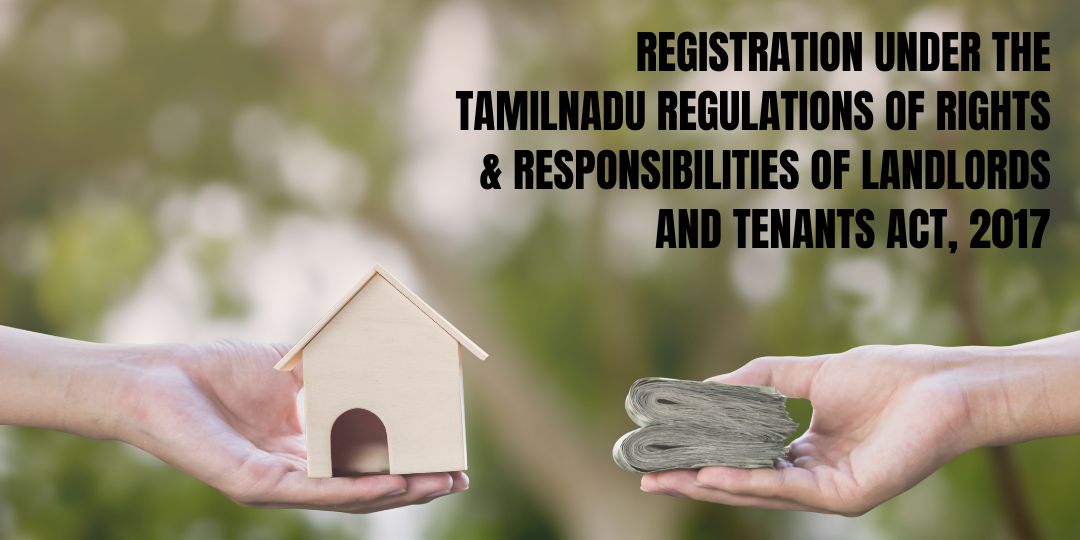REGISTRATION UNDER THE TAMILNADU REGULATIONS OF RIGHTS & RESPONSIBILITIES OF LANDLORDS AND TENANTS ACT, 2017

Arivan V P, Associate, Dispute Resolution Practice
- INTRODUCTION
The Tamil Nadu Regulation of Rights & Responsibilities of Landlords and Tenants Act, 2017, (hereinafter “The Act”), on the lines of the Model Tenancy Act framed by the Government of India, notified in the in the Gazette on 22.02.2019 has been enacted with the intent to ensure regulation of rights of both the Landlords and Tenants equitably and to create a dispute resolution mechanism that is speedy and hassle free. Under the Act, the landlord and tenant are bound strictly as per the terms and conditions of the Tenancy Agreement executed by them. The Tenancy Agreement therefore would have to be clear and descriptive of those rights and responsibilities.
- REGISTRATION OF TENANCY AGREEMENT
- Section 17 of the Registration Act, 1908, regulates registration of documents. Registration is mandatory for Tenancy Agreements, those Agreements that are entered into for a period exceeding a period of 11 months. Appropriate Stamp Duty & Registration charges have to be borne for all Tenancy Agreements.
- Registration as per The Act is independent of the registration requirement as per the Registration Act, 1908. All Tenancy Agreements ought to be registered with the Rent Authority as per Section 4 of the Act to be valid.
- As per Section 4(1) of the Act, no Tenancy shall be entered into, except by an Agreement in writing after the commencement of the Act. With respect to any Tenancy Agreement in writing, entered into prior to the commencement of the Act, the same ought to have been registered with the Rent Authority within 210 days from the date of Notification of The Act. This provision has now become academic as the said time period has already elapsed. For such tenancies where the time limit has elapsed a fresh agreement has to be executed and registered.
- The Tenancy Agreement entered into ought to be registered with the concerned Rent Authority, either by the Landlord or the Tenant within 90 days from execution of the same. The Act further provides for the role and responsibilities of “Property Managers” who may be appointed. The said Property Managers may also apply for the registration of the Tenancy Agreement.
- PROCESS OF REGISTRATION
- Registration under The Act is through a website in http://www.tenancy.tn.gov.in/ operated by the Tamil Nadu Housing and Urban Development Department. Three Categories of Applicants are allowed as per the Rules, viz., Landlords, Tenants and Property Managers. Any one of the said Applicants may follow the procedure envisaged in the website to get their Tenancy Agreements registered.
- The website allows for registration as a User subsequent to which, details such as the relevant District, Taluk and details of the Applicant are required to be entered. The Landlord or Tenant could also be a Company or LLP, in which case the CIN/LLP/MCI number is required to be provided.
- Details such as nature of ownership, title document and description of the Premises are to be provided along with duration and terms of tenancy and identification documents of the Applicant. The scanned copies of the aforementioned documents and all other relevant documents are to be uploaded on to the website for scrutiny by the Department
- The charges for Registration of the Tenancy Agreement through the website is Rs.100/- and is to be paid online through the Payment Gateway provided. After payment, a Receipt of the said payment would be received and the status of the Tenancy Registration Certificate can be verified under the “Check Status” menu.
- Subsequent to verification of all the documents and after the Tenancy Registration Certificate is digitally signed, the PDF file can be downloaded directly from the website. The said certificate will bear a Tenancy Registration Number (T R Number) which is of significance.
- STAMP DUTY & REGISTRATION CHARGES
- A registration with the Rent Authority does not dispense with registration under the Registration Act, if required under the applicable registration laws. The requirement of registration of a tenancy agreement with the Rent Authority is mandatory, immaterial of the period of tenancy and /or its requirement to be registered with the registering authorities under the Registration Act. It also does not amount to a double registration, since the purpose of registration under this Act does not overlap the requirement of registration under the Indian Registration Act.
- Stamp Duty on any of the Agreements of Tenancy will be required to be duly stamped as set out under the Indian Stamp Act, 1899, as in force in the State of Tamil Nadu.
The applicable Stamp Duty and Registration charges as on date:
Stamp duty:
- In cases of residential leases for a period up to 5 years, 0.25% on the advance and/or security deposit and total rent payable for the entire term of the lease. Above 5 years, it will be 1% as applicable to non-residential leases.
(b) In cases of non-residential leases, 1% on the advance and/or security deposit and total rent payable for the entire term of the lease.
Registration charges:
- The lease/tenancy for more than 11 Months need to be registered. For residential leases, 0.25% subject to a maximum of Rs. 5000/- on the advance and/or security deposit and total rent payable for the entire term of the lease.
(d) For non-residential leases, 1% subject to a maximum of Rs.25,000/- on the advance and / or security deposit and total rent payable for the entire term of the lease.
The present user fee for registration of the tenancy agreement with the Rent Authority is Rs.100/- (Rupees One Hundred only). The requisite stamp duty and registration fees, if applicable, are independent of this nominal fee collected for registering the tenancy agreement with the Rent Authority.
- NON-REGISTRATION OF TENANCY AGREEMENT
- The consequences of not registering tenancy agreements as required by Section 4’s sub-section (3) are outlined in Section 4-A. Such unregistered tenancy agreements are deemed to be (a) not impacting any immovable property included therein, (b) not granting any authority to adopt, or (c) not admissible as proof of any transaction impacting such property or granting any right.
- It is clear that Section 4-A of this Act uses language from Section 49 of the Registration Act. However, Section 4-A of this Act does not integrate the proviso under Section 49 of the Registration Act that allows unregistered documents to be accepted as proof of any collateral transaction made without registration.
- Without being registered, the tenancy agreement will not have an impact on the immovable property covered by it, according to sub clause (a). As a result, the transaction that the document was intended to make is inoperative.
- With respect to lease/tenancy for a period of 11 months, registration under this Act alone is not required, sufficient stamp duty is still payable.
- The Hon’ble Madras High Court vide its judgment in V.Manimegalai vs. Selvaraj Kannan,1held that Section 4(3) can only be construed to mean that there must be a written agreement between the landlord and tenant and that is compulsorily registrable and without there being a registered document i.e., rental agreement, it does not have any evidentiary value. In other words, it is inadmissible in evidence. Only to that purpose or to that extent alone, the effect of non-registration of a rental agreement can be construed and the provision of Section 4-A can be pressed into service.
- NECESSITY FOR REGISTRATION UNDER THE ACT
- For all Tenancies entered into subsequent to the commencement of the Act, The Act envisages Tenancy Agreements to be written and to be registered with the Rent Authorities to be valid, specifically with respect to The Act. The Rent authority, which is tasked with the quasi-judicial powers to regulate Tenancy matters would take cognizance of a case only if the Agreement is registered with the Authority and possesses a T R Number.
- The Hon’ble Madras High Court vide its Judgment in Shanmuugam Balakumar & Balajee vs. P. Elizabeth,2Section 4 of the Act mandates an agreement in writing for letting or taking on rent that there shall be a written agreement before or after the enactment and it shall be registered with the Rent Authority.
- Registration of the agreement with the respective Sub-registrar office (SRO) is strongly recommended. In the event the said agreement has to be produced before a Court of Law (Rent Tribunal), the document if unregistered or in coercion standard, would be impounded and the unpaid stamp duty will be collected along with a penalty of 10 times the Stamp Duty payable at the time of execution of the Agreement. The Rent Authority can take cognizance of an Agreement less than a period of 11 months if the same has been registered with the Authority and duty stamped.
- The Hon’ble Madras High vide its judgment in Muruganandam vs Joseph3 has laid down that only those agreements which are entered into after the commencement of The Act and have been duly stamped and registered with the Rent Authority and SRO would be eligible to claim rights under The Act. Those tenancies which have not been registered with the Rent Authority would have no option but to take recourse to the general civil law which may be more time-consuming. The Act, on the other hand, provides for summary procedure to dispose of disputes between Landlords and Tenants with an intention to offer speedy justice to litigants.
- CONCLUSION
Registration of Tenancy Agreements before the SRO and the Rent Authority is therefore mandatory to exercise the Rights and legal mechanisms envisaged under The Act. Both Landlords and Tenants have rights and responsibilities as the name of the Act suggests. Exercising those rights and seeking to impose those responsibilities depends on whether the Tenancy in question has been properly stamped and registered.
REFERENCE
1. 2019(6) CTC 9 = 2019-5-LW-97
2. CRP Nos. 976 & 977/2020 dated 14.07.2020
3. 2022 SCC OnLine Mad 375



